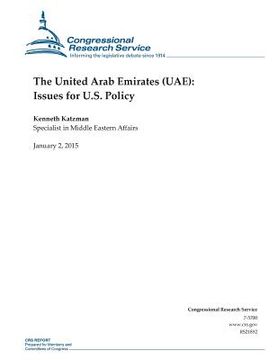The United Arab Emirates (UAE): Issues for U.S. Policy (en Inglés)
Reseña del libro "The United Arab Emirates (UAE): Issues for U.S. Policy (en Inglés)"
The UAE has been a significant U.S. partner in Gulf security for more than two decades, and the alliance has deepened in the course of the U.S.-led effort against the Islamic State organization. A 1994 U.S.-UAE defense cooperation agreement (DCA) provides for U.S. military use of several UAE facilities, primarily the air base at Al Dhafra, and about 5,000 U.S. military personnel are stationed at UAE military facilities. The UAE was the first Gulf state to order the most sophisticated missile defense system sold by the United States (the THAAD), demonstrating support for U.S. efforts to assemble a regional missile defense network against Iran. The UAE has helped pressure Iran by implementing financial and economic sanctions against it, while avoiding antagonizing that large neighbor by maintaining trade and commercial ties with it. The UAE has sought to use a relaxation of tensions produced by ongoing nuclear negotiations between Iran and the international community to try to resolve a territorial dispute with Iran. Yet, suggesting continued wariness of Iranian ambitions in the Gulf, the UAE has sought U.S. assurances that the United States will maintain its commitment to Gulf security. Regionally, the UAE has become increasingly assertive against extremist Islamic organizations, to the point of undertaking some unilateral military action in post-Qadhafi Libya. This stance has also led the UAE to join U.S.-led airstrikes against the Islamic State in Syria; to financially assist the military-led government of Egypt that in July 2013 ousted the elected president, Mohammad Morsi, a Muslim Brotherhood leader; to support moderate Islamist rebel groups in Syria; and to work against other Muslim Brotherhood-related organizations in the region, including Hamas. These activities against political Muslim Brotherhood-linked Islamist movements, which are supported by fellow Gulf Cooperation Council (GCC) states Saudi Arabia, Bahrain, and Kuwait, have led to rifts with fellow GCC state Qatar and with Turkey. Those two countries have been backing Muslim Brotherhood-linked groups in Egypt, Libya, Syria, the Gaza Strip, and elsewhere. Earlier, in 2011, the UAE joined the Saudi-led GCC intervention to help Bahrain suppress a major uprising by its Shiite majority, and the UAE joined U.S.-led airstrikes that helped oust Muammar Qadhafi of Libya. The UAE has maintained over 200 troops in Afghanistan since 2003 and participated in close air support missions for coalition forces there. On domestic politics and human rights issues, the UAE's relatively open borders and economy have won praise from advocates of expanded freedoms in the Middle East, but the social tolerance has not translated into significant political change. The UAE remains under the control of a small circle of leaders who allow citizen participation primarily through traditional methods of consensus-building. Since 2006, the government has provided some formal popular participation through a public selection process for half the membership of its quasi-legislative body, the Federal National Council (FNC). But, the leadership has resisted further opening of the political process and has suppressed both Muslim Brotherhood-linked Islamists and secular opposition activists. To date, the traditional consultations, modest reforms, suppressive measures, and economic wealth have enabled the UAE to popular unrest. Very few policy changes are anticipated should UAE President Shaykh Khalifa bin Zayid Al Nuhayyan leave the scene unexpectedly. He suffered a stroke on January 24, 2014, leaving his younger brother Shaykh Mohammad bin Zayid, who already had substantial governing responsibilities, in charge. President Khalifa has not appeared at recent major events and the extent of his current governing role is likely limited.

